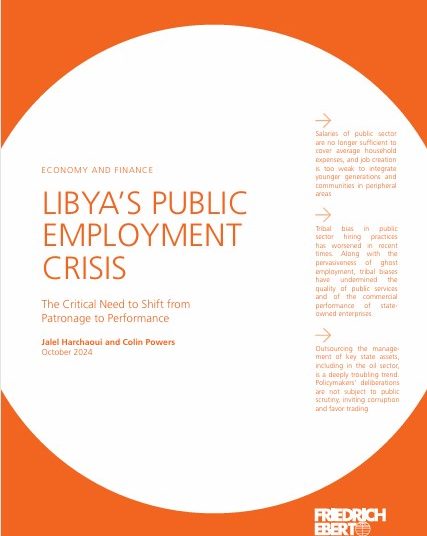A study entitled ‘‘Libya’s public employment Crisis – The Critical Need to Shift from Patronage to Performance’’ published last month by Friedrich-Ebert-Stiftung (FES) and authored by Jalel Harchaoui and Colin Powers, says that public sector employment is failing to provide the needs of the Libyan people.
The 14-page study considers the state of public employment in the post-2011 period. It says the social, political, and economic trajectory of modern Libya has been determined by the manner with which the country’s oil rents have been distributed. Public employment has long been key to the country’s distributive schemes.
Based on field and desk research conducted during the winter and spring of 2024, the analysis advances four main claims:
The first is that public employment is becoming increasingly inadequate as a welfare measure. Despite interim Prime Minister Aldabaiba introducing salary hikes between 2021 and 2023, steep rises in the cost of living mean that the wages of most of those on the government’s books are insufficient for meeting the needs of a family.
The second claim is that the transitional rulers’ tethering of public employment to political and/or distributive concerns, a practice inherited from their predecessors, is driving a decline in the quality of public services and in the performance of state-owned enterprises (SOEs). Across sectors, from education and healthcare to infrastructure maintenance and electricity provision, the Libyan state is providing its citizenry with substandard services. Weighed down by corruption and ghost hires, SOEs show declining commercial performance.
The third claim is that the para-militarization of politics and state—and the attendant emergence of securitized dynamics within policy deliberations—is intensifying the socially and geographically uneven distributive effects of public employment. Since the outbreak of civil war, many public sector jobs have been doled out with the aim of buying or retaining the loyalty of particular tribes or armed groups. The effect has been to exclude the groups and places that lack the political influence necessary to extract work opportunities from the state.
The fourth claim is that reversing public employment-related policy failures requires a wider resolution of the prevailing political situation and the restoration of democratic governance. As long as existing power structures remain in place, it will be difficult to conceive of how public employment might be reoriented toward social and developmental objectives.
MAIN FINDINGS
The study produced six main findings:
(i) Political dysfunction in the post-2011 period worsened the performance of the Libyan public sector, which has declined across social, developmental, and commercial metrics. The public sector today is characterized by irregular hiring practices, ghost employment, and delayed salary payments. It also provides services of increasingly poor quality.
(ii) Attempts at rationalizing the public sector were launched in the summer of 2021. These efforts proved short lived, however, quickly faltering as rulers in the west and east once again succumbed to factionalism and institutional division.
(iii) Despite consuming an outsized portion of the state budget, public sector employment has diminished in its effectiveness as a redistributive mechanism. Although state-funded jobs continue to be created, the Libyan people are deriving fewer social gains than in the past.
(iv) In relative terms, younger cohorts and those from peripheral regions have access to fewer public sector opportunities. This not only deprives these populations of a potential source of income but excludes them from the social and health security that public sector employment provides.
(v) Public sector hiring decisions are increasingly mediated by considerations of power and ‘‘wasta’’ (who you know). Today, jobs are doled out as spoils by the country’s political and military elite. Tribal affiliation and place of residency are often the primary hiring criteria.
(vi) A new generation of private companies, controlled by Libya’s political and military elite and linked with foreign firms, has emerged and inserted itself into both public procurement processes and the management of public assets such as the country’s oil reserves. The firms’ business operations are opaque, create relatively few jobs, and may contribute to increasing inequality by allowing large transfers of public wealth.
The views expressed in this article do not necessarily reflect those of Libya Herald.









